新概念英语第一册单词第123课:澳大利亚之行
- 格式:docx
- 大小:37.51 KB
- 文档页数:2
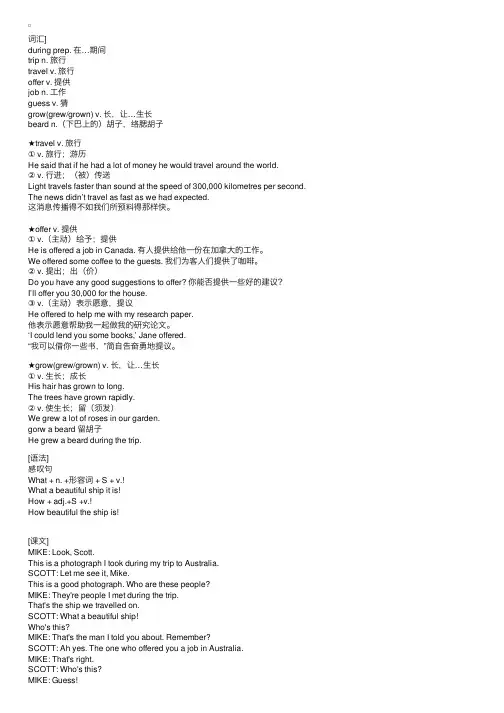
词汇]during prep. 在…期间trip n. 旅⾏travel v. 旅⾏offer v. 提供job n. ⼯作guess v. 猜grow(grew/grown) v. 长,让…⽣长beard n.(下巴上的)胡⼦,络腮胡⼦★travel v. 旅⾏① v. 旅⾏;游历He said that if he had a lot of money he would travel around the world.② v. ⾏进;(被)传送Light travels faster than sound at the speed of 300,000 kilometres per second. The news didn’t travel as fast as we had expected.这消息传播得不如我们所预料得那样快。
★offer v. 提供① v.(主动)给予;提供He is offered a job in Canada. 有⼈提供给他⼀份在加拿⼤的⼯作。
We offered some coffee to the guests. 我们为客⼈们提供了咖啡。
② v. 提出;出(价)Do you have any good suggestions to offer? 你能否提供⼀些好的建议?I’ll offer you 30,000 for the house.③ v.(主动)表⽰愿意,提议He offered to help me with my research paper.他表⽰愿意帮助我⼀起做我的研究论⽂。
‘I could lend you some books,’ Jane offered.“我可以借你⼀些书,”简⾃告奋勇地提议。
★grow(grew/grown) v. 长,让…⽣长① v. ⽣长;成长His hair has grown to long.The trees have grown rapidly.② v. 使⽣长;留(须发)We grew a lot of roses in our garden.gorw a beard 留胡⼦He grew a beard during the trip.[语法]感叹句What + n. +形容词 + S + v.!What a beautiful ship it is!How + adj.+S +v.!How beautiful the ship is![课⽂]MIKE: Look, Scott.This is a photograph I took during my trip to Australia.SCOTT: Let me see it, Mike.This is a good photograph. Who are these people?MIKE: They're people I met during the trip.That's the ship we travelled on.SCOTT: What a beautiful ship!Who's this?MIKE: That's the man I told you about. Remember?SCOTT: Ah yes. The one who offered you a job in Australia.MIKE: That's right.SCOTT: Who's this?MIKE: Guess!SCOTT: It's not you, is it?MIKE: That's right.I grew a beard during the trip, but I shaved it off when I came home. SCOTT: Why did you shave it off?MIKE: My wife didn't like it![课⽂注释]Why did you shave it off?shave it off 把胡⼦刮掉。
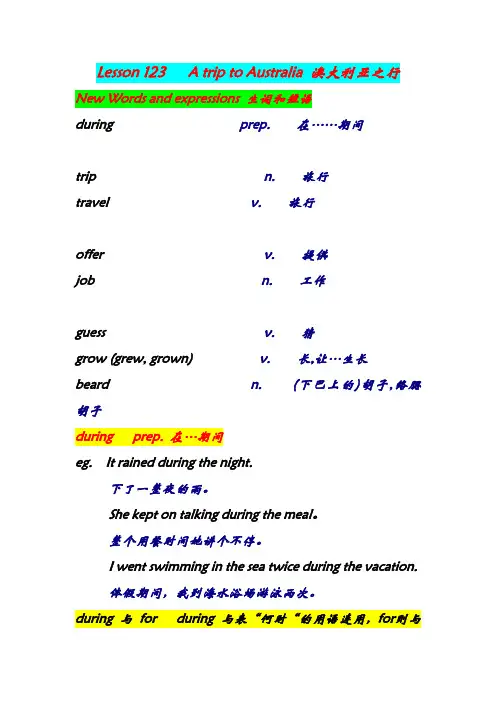
Lesson 123 A trip to Australia 澳大利亚之行New Words and expressions 生词和短语during prep. 在……期间trip n. 旅行travel v. 旅行offer v. 提供job n. 工作guess v. 猜grow (grew, grown) v. 长,让…生长beard n. (下巴上的)胡子,络腮胡子during prep. 在…期间eg. It rained during the night.下了一整夜的雨。
She kept on talking during the meal。
整个用餐时间她讲个不停。
I went swimming in the sea twice during the vacation.体假期间,我到海水浴场游泳两次。
during 与for during 与表“何时“的用语连用,for则与表”时间的长度“连用eg. I was in hospital during June.我在6月间一直住院。
I was in hospital for a month.我住院一个月。
during 与in 表示在某个时间所发生的事,during和in 二者均可用eg. We’re going on holiday during August. = We’re going on holiday in August.我们在8月要去度假。
trip n./ v.1) n. 旅行a bus trip 汽车旅行a business trip 出差go on a trip 出去旅行take a honey moon trip to Hawaii 到夏威夷蜜月旅行eg. My father will make a trip to New York next week.父亲下礼拜要到纽约去。
take a trip 观光旅行(美)make a trip 商务或办事的旅行(美)go on a trip=make a trip=take a trip 去旅行arrange a trip = organize a trip = plan a trip 计划旅行a fielf trip 实地考察a round trip 往返旅行make a side trip to (旅途中)顺路a sightseeing trip 观光旅行a trip to school 上学a trip to the office 上班a trip of the tongue 失言2)v. 绊倒trip over 被…绊倒eg. She tripped over the carpet and fell.她被地毯绊倒。
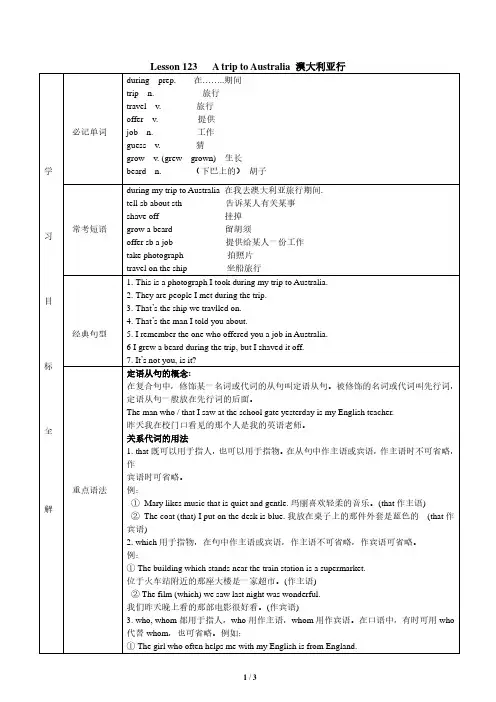
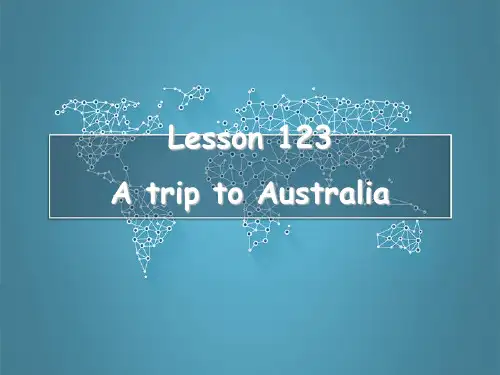
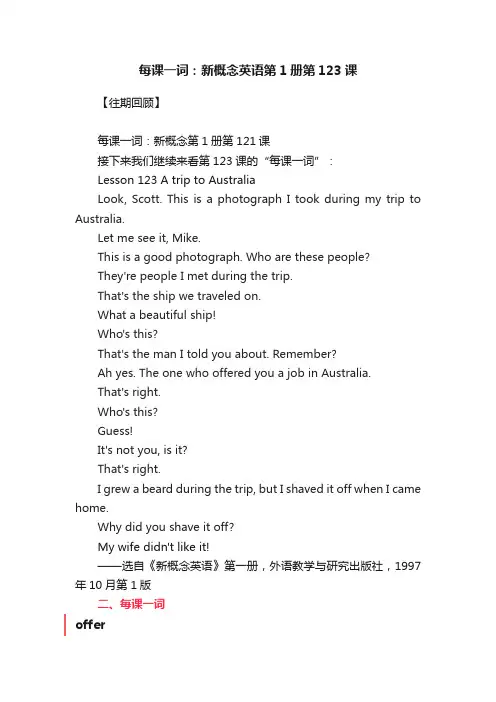
每课一词:新概念英语第1册第123课【往期回顾】每课一词:新概念第1册第121课接下来我们继续来看第123课的“每课一词”:Lesson 123 A trip to AustraliaLook, Scott. This is a photograph I took during my trip to Australia.Let me see it, Mike.This is a good photograph. Who are these people?They're people I met during the trip.That's the ship we traveled on.What a beautiful ship!Who's this?That's the man I told you about. Remember?Ah yes. The one who offered you a job in Australia.That's right.Who's this?Guess!It's not you, is it?That's right.I grew a beard during the trip, but I shaved it off when I came home.Why did you shave it off?My wife didn't like it!——选自《新概念英语》第一册,外语教学与研究出版社,1997年10月第1版二、每课一词offer【源】直接源自古英语的ofrian;最初源自拉丁语的offerre,意为“展示,馈赠”。
【音】['ɒfə(r)]【义】offer常用作动词,表示“提供;提议”。
如:He offered me some tickets.他给了我几张票。
The teacher offered a few ideas to improve the plan.老师提出了几点改进计划的意见。
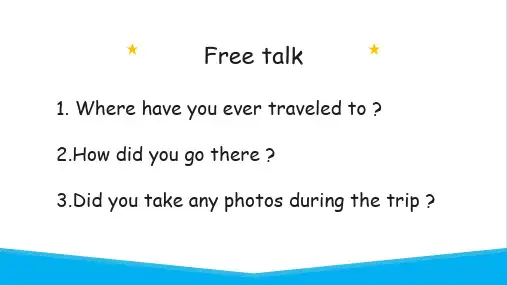
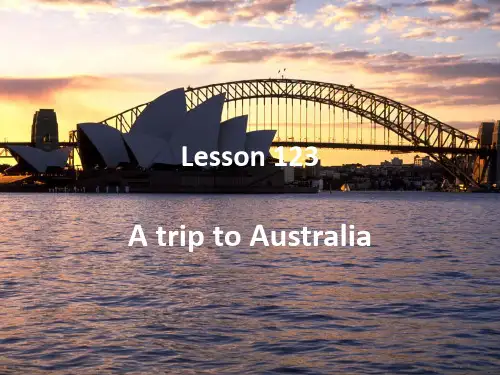
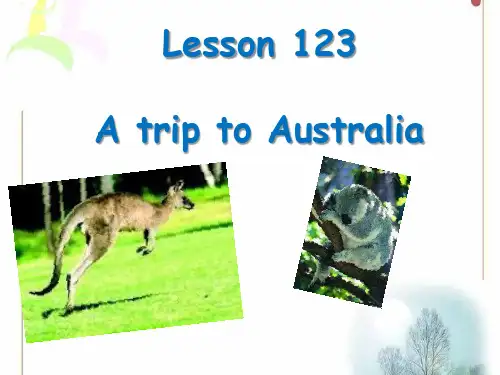
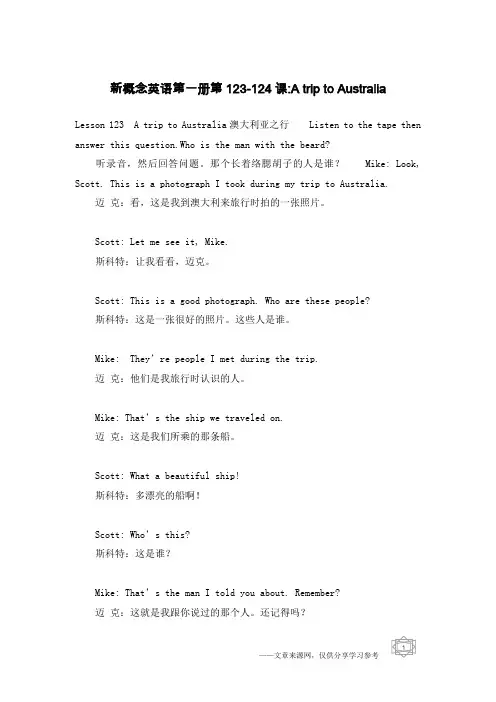
新概念英语第一册第123-124课:A trip to AustraliaLesson 123 A trip to Australia澳大利亚之行Listen to the tape then answer this question.Who is the man with the beard?听录音,然后回答问题。
那个长着络腮胡子的人是谁?Mike: Look, Scott. This is a photograph I took during my trip to Australia.迈克:看,这是我到澳大利来旅行时拍的一张照片。
Scott: Let me see it, Mike.斯科特:让我看看,迈克。
Scott: This is a good photograph. Who are these people?斯科特:这是一张很好的照片。
这些人是谁。
Mike: They’re people I met during the trip.迈克:他们是我旅行时认识的人。
Mike: That’s the ship we traveled on.迈克:这是我们所乘的那条船。
Scott: What a beautiful ship!斯科特:多漂亮的船啊!Scott: Who’s this?斯科特:这是谁?Mike: That’s the man I told you about. Remember?迈克:这就是我跟你说过的那个人。
还记得吗?Scott: Ah yes. The one who offered you a job in Australia.斯科特:啊,记得。
就是在澳大利亚给你工作的那个人。
Mike: That’s right.迈克:对。
Scott: Who’s this?斯科特:这是谁?Mike: Guess!迈克:你猜!Scott: It’s not you, is it?斯科特:这不是你,对吗?Mike: That’s right.迈克:不,是我。
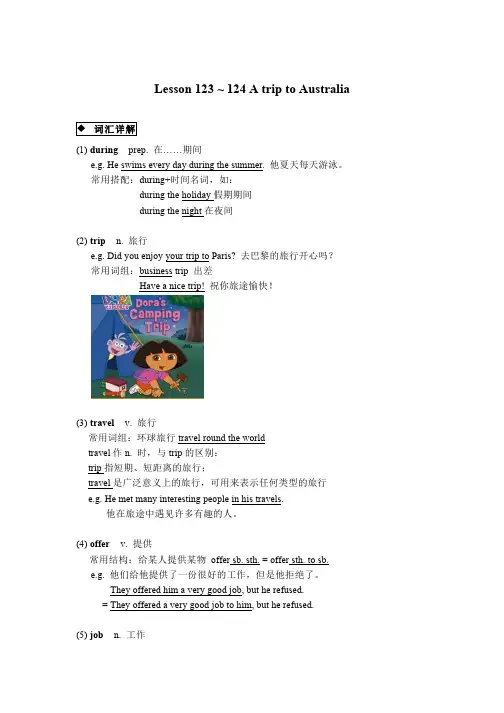
Lesson 123 ~ 124 A trip to Australia!词汇详解(1) during prep. 在……期间e.g. He swims every day during the summer. 他夏天每天游泳。
常用搭配:during+时间名词,如:during the holiday假期期间during the night在夜间(2) trip n. 旅行e.g. Did you enjoy your trip to Paris? 去巴黎的旅行开心吗?常用词组:business trip 出差Have a nice trip! 祝你旅途愉快!(3) travel v. 旅行常用词组:环球旅行travel round the worldtravel作n. 时,与trip的区别:trip指短期、短距离的旅行;travel是广泛意义上的旅行,可用来表示任何类型的旅行e.g. He met many interesting people in his travels.他在旅途中遇见许多有趣的人。
(4) offer v. 提供常用结构:给某人提供某物offer sb. sth. = offer sth. to sb.e.g. 他们给他提供了一份很好的工作,但是他拒绝了。
They offered him a very good job, but he refused.= They offered a very good job to him, but he refused.(5) job n. 工作e.g. What’s your favourite job? 你最喜欢的工作是什么?辨析:job与work1) job是指一份固定的工作或职业,是可数名词。
e.g. My job is a keyboard operator. 我的工作是一名键盘操作员。
2) work是指劳动,work是不可数名词。
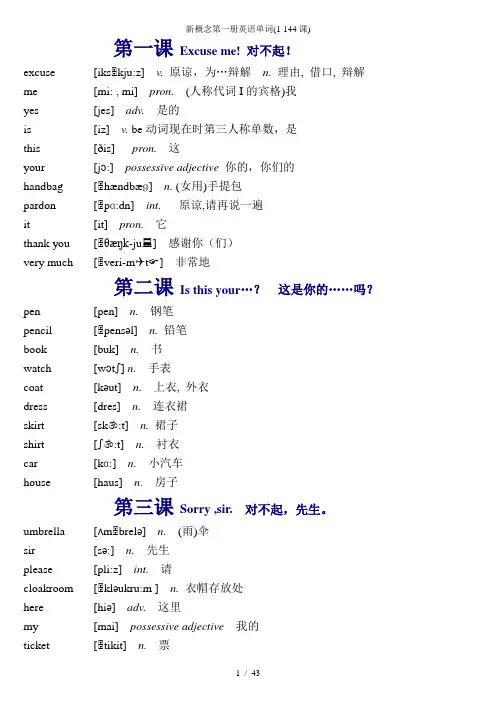
新概念英语第一册第123课单词:澳大利亚之行during ['djr] prep.在……期间【单词例句】A: She always peddles gossip and does nothing during office hours.A:她上班时间总是说闲话,什么事情也不做。
B: Maybe she hasn't got anything to do.B:也许她没什么可干的。
trip [trp] 旅行【单词例句】A: I'd like to join a bus trip.Could you recommend some places for me?A.我想要参加巴士旅行。
能够推荐一些地方给我吗?B: If tlus is your frst time to come here, I'Il say that our City Tour should be your frst choice。
B:如果您是第一次来这儿,那么我认为我们的城市之旅将是您的第一选择。
travel ['træv()l] 旅行【派生词】traveling旅行的traveler旅行者【单词搭配】travel by air乘飞机旅行 travel agency旅行社【单词例句】A: I want to travel to South Africa. Would you please tell me something about it?A:我想到南非旅行。
你能告诉我一些关于那儿的情况吗?B: Sure. There are many different kinds of wild :u:umals, Most of them only appear in Affica.B:当然能够。
那儿有很多不同种类的野生动物,其中绝大部分只有非洲才有。
offer ['f] v提供【单词例句】A: Would you please give me a valuation form?A:你们能给我一个估价单吗?B:Yes, we're glad to offer you free valuation forms.B:是的,我们很乐意为您提供免费的估价单。
新概念英语第一册lesson123-124教案+练习Lesson123 A trip to AustraliaLesson124 (Who)/(whom), (which) and (that)Warm up 但由于先行词people在从句中作met的宾语,因此,一般可以省略。
本课中,类似的句子还有:That's the man I told you about. 这就是我跟你说过的那个人。
What a beautiful ship! 多漂亮的船啊!这是一个感叹句,表明说话人的强烈感情。
what和how都能引导感叹句,其结构如下:what引导的感叹句:Ⅰ.What a/ an +形容词+可数名词单数(+主语+谓语) !What a lovely girl (she is) ! 她是一个多么可爱的女孩啊!Ⅰ.What+ 形容词+不可数名词/ 可数名词复数(+主语+谓语) !What beautiful flowers they are! 多漂亮的花啊!What pleasant weather it is! 多好的天气啊!how引导的感叹句:How +形容词/ 副词+主语+谓语!How blue the sky is! 天空多蓝呀!形容词How quickly he drives! 他开得多快啊!副词The one who offered you a job in Australia. 就是在澳大利亚给你工作做的那个人。
句中的主语“The one”代指上文所提到的“the man”,以免重复。
在本句中,who offered you a job in Australia是一个定语从句,修饰前面的名词the one。
由于被修饰的名词是人并且在从句中作主语,所以关系代词用who, 而且不可以省略。
再如:The one who keeps his word is popular everywhere.信守诺言的人在任何地方都很受欢迎。
新概念英语第一册单词第123课:澳大利亚之行
during ['djr] prep.在……期间
【单词例句】
A: She always peddles gossip and does nothing during office hours.
A:她上班时间总是说闲话,什么事情也不做。
B: Maybe she hasn't got anything to do.
B:也许她没什么可干的。
trip [trp] 旅行
【单词例句】
A: I'd like to join a bus trip.Could you recommend some places for me?
A.我想要参加巴士旅行。
能够推荐一些地方给我吗?
B: If tlus is your frst time to come here, I'Il say that our City Tour should be your frst choice。
B:如果您是第一次来这儿,那么我认为我们的城市之旅将是您的第一选择。
travel ['trv()l] 旅行
【派生词】traveling旅行的traveler旅行者
【单词搭配】travel by air乘飞机旅行 travel agency旅行社
【单词例句】
A: I want to travel to South Africa. Would you please tell me something about it?
A:我想到南非旅行。
你能告诉我一些关于那儿的情况吗?
B: Sure. There are many different kinds of wild :u:umals, Most of them only appear in Affica.
B:当然能够。
那儿有很多不同种类的野生动物,其中绝大部分只有非洲才有。
offer ['f] v提供
【单词例句】
A: Would you please give me a valuation form?
A:你们能给我一个估价单吗?
B:Yes, we're glad to offer you free valuation forms.
B:是的,我们很乐意为您提供免费的估价单。
job [db] 工作
【单词例句】
A:Are you satisfied with your present job?
A:你对你现在的工作满意吗?
B: Yes,I like it very much.
B:是的,我非常喜欢我现在的工作。
guess [ges] v.猜
grow [gr] 让……生长
beard [bd] (下巴上的)胡子,络腮胡子。